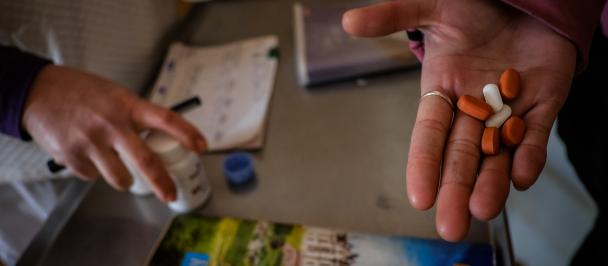Democracy is being hollowed out from within
July 10, 2023

Police patrol a bus during COVID-19 in Prishtina.
Shalini Randeria is the President/Rector of the Central European University. In advance of her Kapuscinski Development Lecture, she unpacks the concepts of soft authoritarianism.
You say that electoral majorities and laws that confer formal legitimacy allow soft authoritarian rule to hollow out liberal democratic institutions and principles from within.
In the current discussion, there is a dichotomy which has been posited between democracies and autocracies. I think this is a mistaken way of looking at the current landscape. Because it's not as if there is a set of governments which are democratic, and others which are totalitarian. It's not as if the ones which are totalitarian have come into power through a violent overthrow or revolution, or tanks in the street or a military coup - the kinds of things we know from the 1960s and 70s. What we have today is a totally different phenomena. It is elected governments, with electoral parliamentary majorities, which are passing laws and making constitutional changes that are hollowing out liberal democratic principles and institutions-like courts, media, and other institutions-from the inside. They have formal legitimacy, because these are elected governments. But what the effect is, and what the aim of the exercise is, to ensure that these once these governments once elected, these leaders can stay in power for longer.
The irony, of course, is that people are democratically voting to allow these things to happen.
We have to remember that therefore this is a messy continuum. This is a systematic and slow process. I don't like to use a term like erosion of democracy or degeneration, because these somehow sound like natural processes. We have to call it by its name: It's an intended dismantling of democratic principles. We are seeing it in many countries, as what one would call a constitutional coup. And we also have what are called consolidated democracies. The important thing is to notice that these are a set of practices. And these practices are cloaked under the legitimacy of formal elections, which are no longer fair, because the rules of the game themselves are being skewed.
What are some of the common practices that these authoritarian, and even some consolidated democratic rulers are using?
I call them soft authoritarian. The softness comes from the fact that these are legal and constitutional means. So in some countries, journalists and academics and civil society activists are in jail. In other countries, courts are dismantling all the gains in progressive rights which have been won hard won over the decades: women's rights, reproductive rights, minority rights, affirmative action, etc... It can also be a use of media and media law. In some countries, the government owns practically 90% of the media, so that the monopoly makes sure that very little information from any other source reaches people. It could be the use of Parliament, or the outlawing of civil society activism, meaning a shrinking space for NGOs and social movements in many countries.
They are all following a script of autocratic legalism, and they are all learning very quickly from one another.
What do you think are the most dangerous impacts that are not directly related to political democracy?
One impact, which we do not see immediately but is an impact on future generations, because it's the impact on educational institutions. This comes about by the takeover of universities, or a changing of curricula, banning of certain disciplines.
They can also be effects on minority rights, which may not be immediately visible. Because don't forget, these are all regimes, leaders, which see majorities in ethnic and nationalist terms. So they are defining or redefining the demos. They're not redefining the borders of the country. What they are redefining is who are the people that belong and who doesn't. They purport to speak in the name of the people, but by excluding certain parts of their own population. They create fear and resentment of Muslims, of the Kurds, of the blacks, of asylum seekers or migrants, of Roma. And then that is instrumentalized politically in order to exclude these groups. By the time the laws have all been put in place, the red line has been crossed, and it's often too late to undo the damage. Women's rights is a major issue in all of these countries, especially women's reproductive rights. These things are all interconnected, but we usually don't see the big pattern unless we put it together.
How do these overall trends affect the way that countries are able to actually move forward in areas around you know, renewable energy or gender equality or lessening incoming inequality?
On the one hand, what we see is that most of these soft authoritarian regimes are also paired with what crony capitalism. These are regimes which are favoring a coterie of their own party, family members or industrialists who are close to the ruling party, who are making enormous economic profit at the cost of the country. So corruption is endemic. And that, of course, is a major roadblock to economic development. On the other hand, what is also being dismantled is the rights of disadvantaged groups. The dismantling of the welfare state and of austerity politics has caused not just resentment, but also economic distress. People have been disempowered, robbed of their jobs, and their incomes have fallen. And therefore, there is fertile ground on which to capitalize on this by turning this resentment against those who have very little to do with the real causes of the crisis.
Democracy, of course, in order to succeed must also deliver. And some of them have delivered. For parts of the population, they have delivered considerable economic gain and, in some cases, political empowerment. But if corruption becomes really endemic to the system, then the economic gains are hardly going to be sustained.
It’s a huge challenge for the work of organizations like UNDP, because I think a lot of the SDGs – like women’s rights, the environment - could just be thrown out because of corruption.
The question everybody has then, is what do we do? We can only defeat them in elections. There's nothing else we can do.
--
Be part of the discussion and join her Kapuscinski Development Lecture at the University of Lisbon live or online. For more info: https://bit.ly/KAPRanderia and register here.

 Locations
Locations



